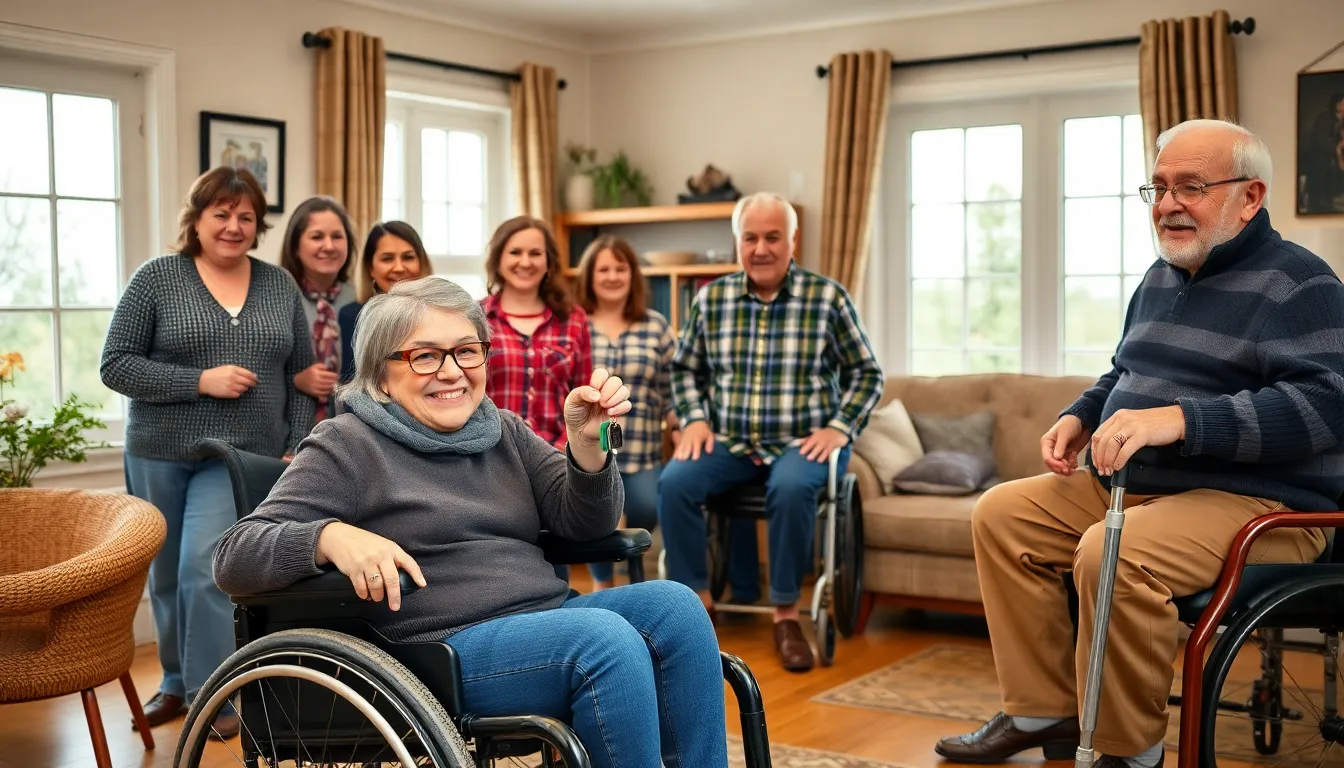Buying a home can feel like trying to climb Mount Everest, especially for disabled individuals facing unique challenges. But what if there’s a secret map to help navigate those treacherous financial terrains? Down payment assistance programs are like a trusty Sherpa, guiding you toward the summit of homeownership without leaving you gasping for breath.
Table of Contents
ToggleUnderstanding Down Payment Help
Down payment help plays a crucial role for homebuyers facing financial barriers. Various programs exist to assist disabled individuals in overcoming down payment challenges.
What Is Down Payment Assistance?
Down payment assistance refers to financial support aimed at covering upfront costs associated with purchasing a home. Programs may include grants, low-interest loans, or forgivable loans that aid in meeting down payment requirements. Each program has specific eligibility criteria, often catering to first-time homebuyers or those with disabilities. Accessing this assistance can significantly ease the financial burden, making homeownership more attainable.
Importance for Disabled Individuals
Down payment assistance holds particular significance for disabled individuals. Many face limitations in income and savings due to medical expenses or reduced employment opportunities. By providing necessary financial support, these programs foster greater independence and adaptability in housing choices. Homeownership creates stability and security, which is essential for personal development. Therefore, down payment help enables disabled individuals to achieve their dreams of owning a home.
Types of Down Payment Help

Down payment assistance plays a crucial role in empowering disabled individuals to pursue homeownership. Various options exist to aid in the financial burden associated with purchasing a home.
Government Programs
Numerous government programs provide essential financial support for disabled individuals. The Federal Housing Administration (FHA) offers various loan products with low down payment options specifically for first-time homebuyers. State and local governments run down payment assistance programs that often include grants or forgivable loans. These initiatives may have funding targeted directly at individuals with disabilities or those experiencing economic hardships. Eligibility requirements differ, but many programs prioritize first-time homebuyers. By accessing these resources, disabled individuals can reduce upfront costs significantly.
Non-Profit Organizations
Several non-profit organizations focus on helping disabled individuals overcome homebuying obstacles. Groups like Habitat for Humanity provide financial aid, offering affordable housing options and assistance with down payments. Local non-profits often partner with financial institutions to create specialized programs tailored to the needs of disabled homebuyers. Workshops, counseling sessions, and financial education opportunities are typically available through these organizations, ensuring that individuals receive comprehensive guidance throughout the purchasing process. These initiatives foster a supportive community and ease the transition into homeownership.
Private Assistance Options
Private assistance options offer additional support for disabled homebuyers seeking down payment help. Some financial institutions provide unique loan products that include grants or lower interest rates for individuals with disabilities. Crowdfunding platforms allow individuals to raise funds for down payments by sharing their stories and connecting with potential donors. Additionally, family members or friends may offer loans or gifts to assist in covering the down payment. These personalized financial solutions complement governmental and non-profit programs, providing a diverse range of resources to make homeownership more attainable.
Eligibility Criteria
Eligibility for down payment assistance programs varies based on multiple factors. Identifying these requirements ensures disabled individuals can access necessary financial support.
General Requirements
Most programs require applicants to meet specific income thresholds. Income limits typically depend on local median income levels, emphasizing affordability for low- to moderate-income households. Additionally, first-time homebuyer status often plays a role in eligibility. Many programs prioritize individuals who haven’t owned a home in the past three years. It’s crucial to have a stable employment history or documented source of income as well. Applicants usually need to demonstrate good creditworthiness, measured by a credit score above a predetermined threshold.
Specific Criteria for Disabled Individuals
Programs often include additional criteria tailored for disabled individuals. Proof of disability, typically through documentation from a healthcare provider, may be necessary. Some initiatives may focus on individuals receiving Social Security Disability Insurance or Supplemental Security Income. Applicants are encouraged to demonstrate financial hardship due to medical expenses or limited employment opportunities. Certain programs directly address the unique needs of disabled individuals, providing more favorable terms and conditions. Additionally, accessible housing options often link to these financial assistance programs, ensuring inclusive support for homeownership.
How to Apply for Assistance
Applying for down payment assistance involves a clear and structured approach. Awareness of specific eligibility criteria helps in finding suitable programs.
Step-by-Step Application Process
Start by identifying potential programs available in the local area or state. Research organizations like the Federal Housing Administration and non-profit entities. After identifying the right programs, gather necessary documents to support the application. Submit the application either online or in person, following the program guidelines. Keep track of submission deadlines to avoid disqualification. Follow up with the agency to check on application status and respond promptly to any requests for additional information.
Documentation Needed
Provide proof of income, including pay stubs or tax returns from the previous year. Include documentation of disability to verify eligibility for specific programs. It’s beneficial to have a credit report ready for assessment by potential lenders. Gather bank statements that show financial stability over the past few months. Prepare any medical documents that illustrate financial hardship from disability-related expenses. Complete any additional forms required by the assistance program to ensure a smooth application process.
Success Stories
Successful outcomes highlight the effectiveness of down payment assistance for disabled individuals. Many have navigated homeownership challenges with the support of these programs.
Real-Life Examples
Jane, a single mother with a mobility disability, accessed a local grant program. This assistance enabled her to cover the down payment on a charming three-bedroom home. Mike, a veteran with PTSD, utilized an FHA loan tailored for disabled individuals. His experience illustrates how the combination of resources can facilitate the journey to homeownership for those facing obstacles.
Impact on Lives
Down payment assistance profoundly impacts the lives of disabled individuals. It reduces financial stress, allowing for more focus on quality of life. Enhanced stability provides opportunities for community engagement and fosters connections. Individuals express feelings of empowerment, as owning a home creates a secure environment for personal growth. Lastly, success stories inspire hope, proving that with adequate support, homeownership remains an achievable goal for everyone.
Down payment assistance programs play a vital role in empowering disabled individuals to achieve homeownership. By addressing financial barriers and offering tailored support, these resources help create pathways to stable living environments. The journey to homeownership may be challenging, but with the right assistance, disabled individuals can navigate these hurdles successfully.
Success stories highlight the transformative impact of these programs, showcasing that financial support can lead to greater independence and improved quality of life. As more people become aware of available resources, the dream of owning a home becomes a reality for many. With determination and the right guidance, disabled individuals can find their place in the community and build a brighter future.



